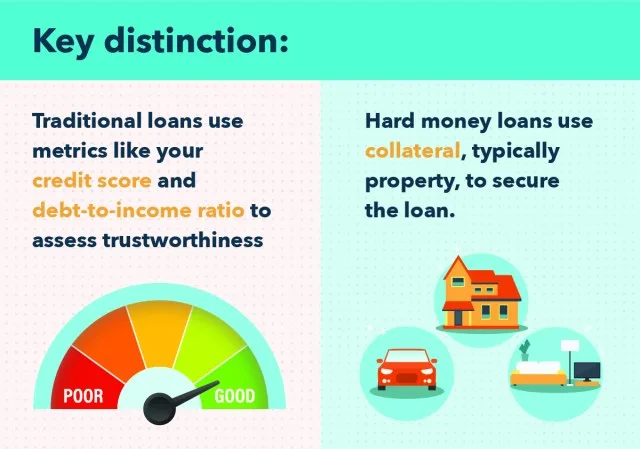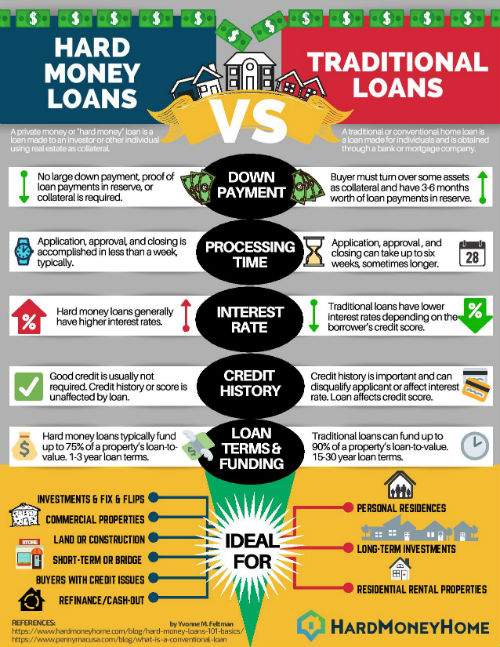In the realm of hard money lending, the evaluation of collateral holds utmost importance. Understanding the intricate process by which hard money lenders assess the value of the collateral is crucial for both borrowers and lenders alike. This article aims to shed light on this subject, detailing the key factors that influence the collateral’s appraisal and the methods employed by hard money lenders to ascertain its worth.
Overview of Hard Money Lending
Definition of hard money lending
Hard money lending is a type of short-term financing in which a borrower obtains funds from a private lender, generally referred to as a hard money lender, using real estate as collateral. Unlike traditional loans from banks or other financial institutions, hard money loans are typically approved based on the value of the collateral rather than the borrower’s creditworthiness or income.
Role of collateral in hard money lending
Collateral plays a crucial role in hard money lending because it serves as security for the lender. If the borrower defaults on the loan, the lender has the right to seize and sell the collateral to recoup their investment. Since hard money lenders are primarily concerned with protecting their interests, the value and marketability of the collateral are of utmost importance.
Factors Affecting Collateral Value
Location of the property
The location of the property is a significant factor in determining its value as collateral. Properties situated in desirable neighborhoods or areas with high demand tend to have higher values, making them more attractive to hard money lenders. On the other hand, properties in less desirable locations may have lower values, making it more challenging for borrowers to secure the desired loan amount.
Condition and age of the property
The condition and age of the property are crucial factors that influence its collateral value. Properties in excellent condition and with modern amenities are generally considered more valuable as they require less immediate maintenance or renovations. Conversely, older properties or those in poor condition may have lower values, as the cost of repairs or updates would need to be considered by the lender.
Market demand and trends
The current market demand for properties in a specific area can significantly impact collateral values. If the local real estate market is experiencing a high demand with limited supply, property values are likely to be higher. Conversely, if there is low demand or an oversupply of properties, values may be lower. Hard money lenders closely monitor market trends to assess collateral value and minimize risks.
Comparable sales and appraisals
Comparable sales and appraisals are instrumental in determining collateral value. Hard money lenders rely on the expertise of professional appraisers who evaluate the property’s market value based on similar properties in the area that have recently been sold. These comparisons provide a benchmark for assessing the collateral value and determining the loan amount that can be approved.
Potential for future value increase
Hard money lenders also consider the potential for future value increase when assessing collateral. If the property is located in an area undergoing significant development or improvement, its value may appreciate over time. Lenders evaluate the market and economic conditions of the area to gauge the likelihood of a future increase in value, which, in turn, affects the loan-to-value ratio (LTV) and the amount they are willing to lend.

Types of Collateral Accepted by Hard Money Lenders
Real estate properties
Real estate properties, such as houses, apartments, condos, and multifamily dwellings, are the most common types of collateral accepted by hard money lenders. These properties provide a tangible asset that can be sold to recover the lender’s investment in case of default.
Land and vacant lots
Hard money lenders also accept land and vacant lots as collateral, although the value of these properties may be assessed differently from developed properties. Lenders consider factors such as zoning restrictions, development potential, and location when evaluating the collateral value of land.
Fix-and-flip properties
Properties purchased with the intention of renovating or “flipping” them for a profit are popular collateral options for hard money lenders. These properties offer potential for increased value after repairs or renovations, making them attractive to borrowers seeking short-term financing.
Commercial properties
Hard money lenders may accept commercial properties, such as office buildings, retail spaces, and industrial warehouses, as collateral. These properties tend to have higher values but may also pose greater risks due to market fluctuations and potential vacancies.
Residential properties
Residential properties, including single-family homes and townhouses, are commonly accepted as collateral by hard money lenders. The value of these properties is typically determined by factors such as location, condition, and market demand.
Methods Used to Determine Collateral Value
Appraisal by professional appraisers
Professional appraisers conduct a detailed analysis of the property, taking into account various factors such as location, size, condition, and recent comparable sales. They provide an unbiased opinion of the property’s value based on their expertise and knowledge of the local real estate market.
Automated valuation models (AVMs)
Automated valuation models are computer algorithms that estimate property values based on data analysis, including recent sales, market trends, and property characteristics. While AVMs can provide a quick estimate, they may not always capture the intricacies that an appraiser considers.
Broker price opinions (BPOs)
Broker price opinions are evaluations of property value conducted by licensed real estate brokers or agents. BPOs take into account factors such as recent sales, property condition, and market conditions. While not as detailed as a formal appraisal, BPOs can be a cost-effective option for assessing collateral value.
Comparable sales analysis
Comparing the subject property to recently sold properties with similar characteristics is a common method used to determine collateral value. Appraisers and lenders analyze the sales prices of comparable properties to estimate the value of the property in question.
Physical assessment and inspection
A physical assessment and inspection involve evaluating the condition and quality of the property’s structure, systems, and overall appeal. This method allows lenders to gain a comprehensive understanding of the property’s worth and potential risks.

Loan-to-Value Ratio (LTV)
Explanation of Loan-to-Value ratio
The Loan-to-Value (LTV) ratio is a crucial factor in hard money lending that determines the maximum loan amount a lender is willing to provide in relation to the appraised value of the collateral. It is expressed as a percentage and is calculated by dividing the loan amount by the appraised value of the property.
Importance of LTV in assessing collateral value
LTV plays a significant role in assessing collateral value because it determines the level of risk a lender is willing to undertake. Higher LTV ratios indicate a higher risk for the lender, as it means the borrower has a smaller equity stake in the property. Therefore, lenders typically set maximum LTV ratios based on their risk tolerance and the specifics of the loan application.
Typical LTV ratios in hard money lending
Typical LTV ratios for hard money loans range from 60% to 75%. Since hard money lenders rely heavily on collateral value, they tend to offer lower LTV ratios compared to traditional lenders who may consider other factors such as credit history and income. The specific LTV ratios offered by hard money lenders depend on various factors, including the borrower’s experience, the property’s condition, and the location.
Examination of Title and Ownership
Verification of property ownership
Hard money lenders conduct a thorough verification process to ensure that the borrower has legal ownership of the property being used as collateral. This involves reviewing title documents, deeds, and other legal documents to confirm ownership rights.
Search for liens and encumbrances
Lenders also search for any outstanding liens or encumbrances on the property that could affect the collateral’s value or the lender’s ability to recover their investment. Liens, such as mortgages or tax liens, can hinder the lender’s priority position in the event of default.
Title insurance and its role
Title insurance is commonly required in hard money lending to protect the lender against any unforeseen claims or defects in the property’s title. By obtaining title insurance, the lender safeguards their investment and ensures they have a legal claim to the collateral.

Investigating Property History
Review of past sales and purchase records
Hard money lenders investigate the property’s history by reviewing past sales and purchase records. This allows them to evaluate any previous fluctuations in value and understand the property’s market performance over time.
Assessment of any legal issues or disputes
Lenders also assess the property’s history for any legal issues or disputes that could impact its value or future ownership. Any ongoing lawsuits or disputes can complicate the lender’s ability to foreclose on the collateral in case of default.
Confirmation of property taxes and assessments
Lenders verify the payment of property taxes and any assessments levied on the property. This ensures that the borrower is up to date with their financial obligations and adds to the overall assessment of the collateral value.
Determining Property Condition
Inspection of property structure and systems
A thorough inspection of the property’s structure and systems is conducted to evaluate its overall condition. This includes assessing the roof, foundation, electrical and plumbing systems, and other critical components to determine if any repairs or maintenance are required.
Evaluation of repairs and renovations needed
Hard money lenders consider the costs of necessary repairs and renovations when assessing the collateral value. Properties in poor condition may have lower values, as lenders must account for the expenses required to bring the property to a marketable condition.
Determining the overall marketability of the property
The marketability of the property is a critical factor in assessing its collateral value. Lenders consider the property’s appeal to potential buyers or renters and its ability to generate income. Factors such as location, property type, and amenities influence marketability and subsequently impact the collateral’s value.

Evaluation of Local Market
Analysis of local real estate trends and conditions
Hard money lenders analyze local real estate trends and conditions to gain insights into the market’s performance and stability. Understanding factors such as price appreciation, demand, and overall market health helps lenders assess the potential risks and rewards associated with the collateral.
Understanding demand and supply dynamics
By studying demand and supply dynamics, lenders can ascertain the market’s competitiveness and the likelihood of the collateral maintaining or increasing its value. Areas with high demand and limited supply are generally viewed as more stable and favorable collateral options.
Assessment of local economy and employment
The local economy and employment trends are crucial considerations for lenders when evaluating the collateral value. A stable economy with strong employment prospects usually leads to increased property demand and higher values, making it a more secure collateral option.
Assessing Borrower’s Experience and Track Record
Review of borrower’s past investment projects
Hard money lenders review the borrower’s past investment projects to assess their experience and track record. This involves evaluating the success rate of previous projects, including an analysis of profits earned and the ability to meet financial obligations.
Verification of borrower’s success rate
Verifying the borrower’s success rate entails conducting due diligence on their previous borrowing and repayment history. Lenders may request financial statements and credit reports to evaluate the borrower’s ability to handle their financial responsibilities.
Assessment of borrower’s knowledge and expertise
Lenders assess the borrower’s knowledge and expertise in the real estate market to gauge their ability to manage the property effectively and generate a return on investment. Knowledge of market trends, property management, and risk mitigation strategies are all valuable considerations when evaluating the borrower’s experience.
In conclusion, hard money lenders undertake a comprehensive assessment of the collateral value based on factors such as location, property condition, market trends, comparable sales, and various analytical methods. Coupled with an evaluation of the borrower’s experience and track record, this assessment ensures the lender makes an informed decision and minimizes risks associated with hard money lending.




